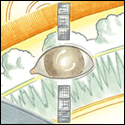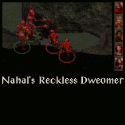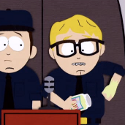|
PeterWeller posted:First of all, I was wrong. Priests and wizards did get one more initial slot than warriors. But basically, they were like the secondary skills previously mentioned split into five categories: warrior, wizard, priest, rogue, and general. You got a number of initial slots with which to purchase proficiencies. They usually cost one slot, but if you chose a proficiency from outside your class and the general category, it cost one extra slot, sort of like 3E's cross class skills. There were also humorous ways to break them from time to time (like the hunting story above) that stayed in the realm of 'funny' because they generally didnt mess with the more suspenseful parts of the game.
|
|
|
|

|
| # ? Jun 11, 2024 16:06 |
|
Yeah, the only problem with NWPs was that they sometimes were less like non-combat skills and more like 3E's more combat oriented feats. For example, Dark Sun included armor optimization which gave you a 1 point bonus to AC as long as you had any sort of armor on. It didn't upset balance, especially in Dark Sun with its lovely armor, but it was a no-brainer for anyone who could take it.
|
|
|
|
There was also a "Danger Sense" proficiency that I took while playing a Lizardman, which occasionally resulted in the DM rolling behind the screen and then looking over at me and saying "Lizard Sense... Tingling!"
|
|
|
|
fatherdog posted:There was also a "Danger Sense" proficiency that I took while playing a Lizardman, which occasionally resulted in the DM rolling behind the screen and then looking over at me and saying "Lizard Sense... Tingling!"
|
|
|
|
You know, it's a shame they didn't replace most of the feats with powers. I'm thinking now something like Mighty Cleave wouldn't be so loving broken if it was an encounter power (although give it something substantial, like a multiplier to damage to ensure they can cut through enemies). Leave feats for something that numerically improves the gameplay of a character, while keep powers as stuff that does crazy-rear end maneuvers and abilities.
|
|
|
|
fatherdog posted:You got a certain number of "slots" for non-weapon proficiences at first level, and then gained more as you gained levels. The initial number was based on your class. Almost all of the "kits" in the "Complete X" series of books involved giving you bonus non-weapon proficiencies in addition to their other benefits. The proficiencies were associated with an attribute, and generally listed a number of things the proficiency allowed you to do with a "proficiency check", which meant applying a modifier to the associated skill and then rolling under that number on a d20. This sounds pretty rad, and also quite a good way to get your players thinking about their characters and their lives outside of beating up goblins. More people should do that. You must have better DMs than me, though, because I've never been in a campaign where any thought has been given as to how we're feeding ourselves out in the wilderness. I like wilderness-survivalist type characters. I take whatever the system's equivalent of the Survival skill is and a whole bunch of travel rations every game, and it's like "why bother?" 
|
|
|
|
The Sin of Onan posted:This sounds pretty rad, and also quite a good way to get your players thinking about their characters and their lives outside of beating up goblins. More people should do that. In every discussion of campaigns online, I realize that I've been tremendously fortunate in terms of DMs.
|
|
|
|
ProfessorCirno posted:I disagree with both of these: even most recent RPGs haven't learned their lesson regarding extra attacks (and the one thing worse, Initiative Passes), and there isn't a chance in hell that 5e wouldn't inevitably start walking back to that. I am new to tabletop games and relevant grog, I get alignment hate but what is so specifically bad about extra attacks (and what are initiative passes?). It's not immediately obvious why those break a system or whatever
|
|
|
|
Boing posted:I am new to tabletop games and relevant grog, I get alignment hate but what is so specifically bad about extra attacks (and what are initiative passes?). It's not immediately obvious why those break a system or whatever It all depends on bonus stacking. If there's no way to get huge static bonuses, riders, etc. it's not a problem. If there is, it breaks the math.
|
|
|
|
I guess my question is how does it break the math exactly?
|
|
|
|
Boing posted:I guess my question is how does it break the math exactly? Ok, so in D&D most of your damaging options (spells, attack actions, etc.) involve rolling some number of small dice, typically d4s, d6s or d8s. The average results of those dice are 2, 3, and 4 respectively; Not exactly a huge jump. If an effect gives you a +1 or +2 to damage that's at most a 100% increase to damage, and possibly as little as 25% increase. If something grants extra attacks, however, that's a 100% increase no matter what (assuming average dice results). When your attacks start doing 3d8 it becomes even more pronounced, with the fixed boost increasing it from 12 to ~14 or so, and the extra attack is from 12 to 24. Add in the fact that it gives you more opportunities to hit so your rounds are a lot less streaky and it just makes everything a math mess.
|
|
|
|
Boing posted:I guess my question is how does it break the math exactly? For any attack, at a minimum you should have bonuses from stats, magic items, and feats. On top of that, you just keep adding more. Eventually, if the game is like 3e or 4e, these static modifiers outweigh damage dice pretty badly. Let's use AD&D for an example. A very strong Fighter might get +6 to damage from his Strength. 1e is pretty tightly constrained, damage - wise, but we're using specialization here. So let's look... Both have +3 weapons. Swordy is specialized in Swords. He gets +1 to-hit and +2 damage and slowly earns extra attacks. At 13th he gets (iirc) 3 per round, dealing 1d8+11 each. Darty is specialized in Darts. He gets an increased rate of fire instead of static bonuses. At 13th, he makes 6 per round, dealing 1d3+9 each. So, the deadliest fighter in the world tosses darts for a living.
|
|
|
|
Boing posted:I am new to tabletop games and relevant grog, I get alignment hate but what is so specifically bad about extra attacks (and what are initiative passes?). It's not immediately obvious why those break a system or whatever Moving on, let's say you actually have two dollars spare to spend on extras. You can get cream and raspberry filling, or cream on two cakes, or raspberry on two cakes. Which is better? Well, the first gets you one cake and two toppings. So cake +$2 of toppings. Either of the latter gets you two (of the same) topping, plus an extra cake. That's $3 worth of extras for only $2! Again the answer is clear. And again, that's assuming that a second cake is only worth a dollop of cream. Now let's say the shop doesn't just sell cake. Let's say it also sells cookies (in this analogy the cookies are character benefits that do not apply to attacks), also for $1. You are going with the two cakes option and have one dollar spare. What do you spend it on, raspberry filling or a cookie? Well, if cookies and two cakesworth of raspberry filling are both worth $1, then it's a toss up. But that means that one raspberry filling is only worth 50c! Anyone NOT buying two cakes is getting ripped off by 50c! So anyone not buying two cakes would never buy filling, and anyone who wants filling has to buy two cakes just to get their money's worth. On the other hand, if one cakesworth of raspberry filling IS worth $1, then anyone already investing in two cakes would be mad to waste money on a cookie! How is a shop owner supposed to price things so that they always work out? So far, nobody has found an answer. No matter what funny math people have thrown into things there's going to be an obvious point where "x2" is better than "+X", and in some cases have made it even worse. Even if you only allow the filling/cream etc in one cake then the two-cakes customer still has the security of knowing that he is way more likely to get one of his plain cake bases home intact to apply the toppings to, while someone with only one, slightly nicer cake has a much higher chance of fumbling away his only dessert before he even gets to the car. e: Also whatever mathematical solution you come up with has to be easy enough to use that you can actually Splicer fucked around with this message at 15:43 on Mar 19, 2013 |
|
|
|
Splicer posted:cakes talk This is a brutal post for a dude on a "no sweets" diet to read but it was immensely helpful. Regarding alignments: the true problem with alignments isn't when they're written stupidly, such as True Neutral meaning you swap sides halfway through a battle or Chaotic Neutral meaning that you're "purple monkey dishwasher" style random (although those are pretty drat terrible). The real problem is when you get alignments interacting with mechanics. I really liked the 4E approach to alignment and the fact that it's getting booted in favor of Ye Olde Way is unfortunate.
|
|
|
|
PantsOptional posted:This is a brutal post for a dude on a "no sweets" diet to read but it was immensely helpful. Alignment is one of the few things I think Palladium got right. I know, it's heresy to think Siembieda did anything right, but hear me out. If you're going to use an alignment system, why not give a good run down of the sort of person this alignment makes you? Rather than weighty philosophical debate, Palladium provided an ethics list with specific examples, rather than a vague code. As a tool for figuring out personality types, this helped me a lot as a new player. I've grown out of it because I'm not in 8th grade anymore and can figure out my character's personality without needing a pre-generated label, but it was helpful when I was just starting out. Bits like quote:NEUTRAL and quote:GOOD ALIGNMENTS contrasted with quote:SELFISH ALIGNMENTS (But Not Necessarily Evil) were way more helpful than quote:Lawful Good, "Crusader" and quote:Chaotic Neutral, "Free Spirit" A helpful fellow transcribed the rest of them here http://therpgtable.proboards.com/index.cgi?board=rules&action=print&thread=40
|
|
|
|
Really I think the easiest way to say why multiple attacks are a problem is two-fold. 1) Each extra attack increases all damage you deal by 100%. 2) Each extra attack increases all dice rolled by 100%. This means that multiple attacks very quickly becomes better then any other option, but also slows down the game more then almost any other option.
|
|
|
|
The Sin of Onan posted:This sounds pretty rad, and also quite a good way to get your players thinking about their characters and their lives outside of beating up goblins. More people should do that. That doesn't mean you only challenge them with content that aligns specifically to their interests, but you certainly don't ignore or wash over things they feel are central to their characters. In a party where no one cared about ratios or resource management, you wouldn't focus on it. You could still have an adventure hook caused by someone or something stealing the party's travel rations while they were out in the wilderness though. Do they track it down? Do they come up with alternate rations? Do they divert their trip to a nearby settlement to buy more? Have Some Flowers! fucked around with this message at 18:05 on Mar 19, 2013 |
|
|
|
On multiple-attacks chat; what is the goon consensus on attacks like Twin Shot, Split the Tree, or a DnD 4e power that deals 3[w] damage?
|
|
|
|
TalonDemonKing posted:On multiple-attacks chat; what is the goon consensus on attacks like Twin Shot, Split the Tree, or a DnD 4e power that deals 3[w] damage? Ignoring everything else, a standard level 1 at-will "lots of damage" bow attack will be doing an average of about (5 + 1 + 5.5 =)11.5 damage, if it hits. Assuming you hit on a 10+, that's a dpr of 6.325. Twin Shot deals an average of 5.5 damage per hit, or a dpr of (3.025x2) = 6.05. Man that sucks, doesn't it? But you add a +1 damage effect (of which there are loads) and suddenly you have 6.875 vs (3.575x2) = 7.15 dpr. Just from one measily point of bonus damage! Pretty much a no brainer. So you've already passed the High Damage attack and are getting double-duty from any other boosters you choose to tack on (and why the hell wouldn't you tack on as many as you can?). Also, the Damaging Shot is an all-or-nothing. If the bad guy is on only a couple of HP (or is a minion) then the odds of hitting him with at least one of the Twin Shots is way higher, and if you hit him with the first one you can shoot someone else. When you take into account things like Hunters Quarry then it all goes out the tubes. Now, a 3[W] power is an entirely different kettle of fish. Static modifiers don't get multiplied, just the number of [W] dice you roll. So it's just like having a power that says "This attack does 2dX extra damage, where X is equal to your weapon die". Sure it's more useful if you're wielding a greataxe than a dagger, and a brutal greataxe bumps it up a bit higher, but there's a far cry between "Bigger weapon means more damage" and "Two prones for the price of one". Splicer fucked around with this message at 17:21 on Mar 19, 2013 |
|
|
|
A lot of multi-attacks are rooted in a belief that one attack roll implies exactly one swing of a weapon, or arrow from a bow. So if you're attacking with two weapons, obviously you need to have two rolls! If you get past that, and abstract an attack to refer to whatever force you bring to bear against an enemy in a single round (incidentally, how D&D worked until 3E), then there's really no need to have multiple attacks against a single target, ever. It's a waste of time and pointless to even try to balance. On the other hand, I think multi-attacks, each against a different target, are fine. They're more situational, especially in melee, and generally, doing X damage to two enemies is less useful than 2*X to one, due to the benefits of focusing fire. For my ideal version of what Next is trying to do, I would give two-handers a 2d8 base damage, one-handers a d8 base damage, and light weapons a d6 base damage. Then, if you dual wield a one-hander and a light weapon, you can either attack one enemy with both weapons for d8+d6 base damage (one attack, static modifiers add only once), or two enemies (one attack each, static modifiers to both). So the net result is the two-hander has slightly better single-target damage, while the dual-wielder has more flexibility in targeting multiple enemies built-in. All of that would be without feats, which would not exist (at least not in the 3E/4E form).
|
|
|
|
eth0.n posted:For my ideal version of what Next is trying to do, I would give two-handers a 2d8 base damage, one-handers a d8 base damage, and light weapons a d6 base damage. Then, if you dual wield a one-hander and a light weapon, you can either attack one enemy with both weapons for d8+d6 base damage (one attack, static modifiers add only once), or two enemies (one attack each, static modifiers to both). So the net result is the two-hander has slightly better single-target damage, while the dual-wielder has more flexibility in targeting multiple enemies built-in. All of that would be without feats, which would not exist (at least not in the 3E/4E form).
|
|
|
|
One thing to consider about multiattacks is that they can help even out variance in damage. If a fighter swings once a round for huge damage, he'll experience big spikes in damage when he succeeds at successive attack rolls, and he'll experience big droughts in damage when he fails at successive attack rolls. If he swings 3 time a round for smaller damage, then he's more likely to be consistent from round to round. His average damage over 100 rounds may be the same for both scenarios above, but the multi attacks scenario may be more preferable when combat is limited to 5 or 6 rounds (like a regular DND encounter). eth0.n posted:So the net result is the two-hander has slightly better single-target damage, while the dual-wielder has more flexibility in targeting multiple enemies built-in. All of that would be without feats, which would not exist (at least not in the 3E/4E form).
|
|
|
|
Have Some Flowers! posted:One thing to consider about multiattacks is that they can help even out variance in damage. *Excluding the "More rolls means longer turns" problem. Now, if you're specifically referring to 3.x BAB "get another attack at -5" multi-attacks, they're awful for entirely different reasons.
|
|
|
|
Have Some Flowers! posted:One thing to consider about multiattacks is that they can help even out variance in damage. If you want to reduce variance, there are easier, and less play-time consuming ways to do it. Like lower ACs across the board, but raise HP or lower damage. quote:In eth0.n rpg, would someone with a 2Her be able to make an opportunity attack? Or are they too slow and clumsy for that? That might be another perk of the 1Her's, even if they only get an opportunity attack with one of two dual wielded weapons. It might make sense to make all OAs use a single d8 damage die for 2handers, and only being able to use the main hand for dual-wielders, so that sword-and-board fighters aren't worse at defending than dual-wielders and 2handers, but it would be for the sake of gameplay, not an attempt to model 2handers being "slow and clumsy". Also, while I wouldn't want to take away OAs based on weapon type, I could see making OAs strictly a Defender mechanic.
|
|
|
|
Have Some Flowers! posted:One thing to consider about multiattacks is that they can help even out variance in damage. That more an issue of DnD's binary resolution system than of single/multiattacks. Of course, multiple attacks is a way to work around the binary issue, but in DnD's case where you need to add a number to the result and compare it to another number that is never the same will make the system terribly slow.
|
|
|
|
eth0.n posted:If you want to reduce variance, there are easier, and less play-time consuming ways to do it. Like lower ACs across the board, but raise HP or lower damage. eth0.n posted:Also, while I wouldn't want to take away OAs based on weapon type, I could see making OAs strictly a Defender mechanic. From a flavor standpoint, an OA is just taking advantage of someone's opening, and really any class with martial training should be able to do it if you really want to encourage people to move carefully in combat and use ranged abilities from a distance. Rexides posted:That more an issue of DnD's binary resolution system than of single/multiattacks. Of course, multiple attacks is a way to work around the binary issue, but in DnD's case where you need to add a number to the result and compare it to another number that is never the same will make the system terribly slow. I don't really have strong opinions for or against multi-attacks. I do recognize that the game is currently balanced with them in mind, and there are a lot of interrelated moving parts that would need to be adjusted if those mechanics were changed. My overall point is that multi-attacks seem to be something that players enjoy because it naturally feels like 'haste' or a flurry of blows. Speeding up combat is a good goal to have though, and that may be one small thing to adjust that would help. There are many more things that eat up time than just a second roll of the dice though (which could have been rolled at the same time as the first attack).
|
|
|
|
Have Some Flowers! posted:That works too but lowering AC, raising HP or lowering damage have other consequences as well. That affects healing resources and management, minion interactions, powers that apply status conditions or have follow-ups on-hit and so on. Sure, every change to a game effects a lot of things. But given a system without multi-attacks, that you want to reduce the variance of attack results of, the side-effects and balance issues of lowering AC are a heck of a lot easier to predict and deal with than adding on multi-attacks. Especially multi-attacks that aren't default for everyone, and have to be chosen in lieu of other things, as has been traditional in D&D. quote:One thing to consider is that OA's often give people incentives to avoid Defenders rather than engage them. "I shift away, then charge something else." 4E tried to address this by giving Defenders incredibly sticky mechanics that forced people to stay next to them, or else. It's usually not just the OA that's forcing someone to attack a Defender, but rather some other interaction of abilities. Most 4E defender mechanics are incentives to not engage in the first place. If you're really sticky, your enemies will want to avoid being stuck. OAs are just a relatively weak defender mechanic. Anyway, I probably wouldn't limit OAs; I meant that more as an example of what I think is worth considering if we wanted to limit how many characters need to deal with OAs. It would be more sensible to limit to Defenders, than to single out 2handers. quote:If the concern is that hidden defenses and extensive bonuses and penalties slow down combat, I don't think the solution is 'less combat'. There's a bigger problem to be addressed. Rolling fewer dice isn't "less combat". Making fewer meaningful tactical decisions is "less combat". If you're built to multi-attack as your normal attack method, choosing to do so is not a meaningful tactical decision; it's an obvious decision. Replacing it with a mechanic that represents the same thing, but is rolled as a single attack roll and damage roll is not "less combat". quote:I don't really have strong opinions for or against multi-attacks. I do recognize that the game is currently balanced with them in mind, and there are a lot of interrelated moving parts that would need to be adjusted if those mechanics were changed. What game is currently balanced with them in mind?
|
|
|
|
I listened to the new Next podcast so you don't have to. It's about the new playtest packet today @ http://www.wizards.com/dnd/Article.aspx?x=dnd/4pod/20130320 -Extra martial damage will be based on weapon now so the weapon you use matters. So like 1d8 longsword damage +3d8 instead of 1d8 + a static 3d6. -Damage down across the board for players. Spells+weapons. Paladin: They actually pronounced blackguard correctly. Rhymes with haggard. Paladin concept now is basically 'guy with an oath'. Ranger: They talked about the ranger favored enemy and how that actually worked at the table back in previous editions (it sucked). So the new favored enemy thing will be applicable against anyone, stuff like 'immune to fear'. They talked a lot about adding custom favored enemies like "my family fought against the Wizardlords so I have resistance to magic", but despite being a cool idea it's not actually in the game. Fighters: They realize the damage dice thing sucked since it was optimally used for extra damage. So extra damage will be automatic now and leave the bonus dice for parrying/blocking/whatever. Fighter was causing things to "explode like blood sausages". Warlord: Mearls actually brought it up. Mentioned spending martial dice for reducing incoming damage. More to come on warlord later. Rogue: Lots of 'blah blah' about rogues changing from skill monkey to alpha striker (backstab x4) to consistent DPS striker over the years and wtf to do with them now. Sounds like they are sticking with the striker role. The new DMG: Will 'look the most different from prior editions'. Will have stuff on tinkering with the system.
|
|
|
|
ritorix posted:Paladin: They actually pronounced blackguard correctly. Rhymes with haggard. Paladin concept now is basically 'guy with an oath'.
|
|
|
|
ritorix posted:I listened to the new Next podcast so you don't have to. It's about the new playtest packet today @ http://www.wizards.com/dnd/Article.aspx?x=dnd/4pod/20130320 I'm gonna be That Guy for a moment and say that I really do wish that they provided transcripts or summaries of podcasts like this, ones that are meant to convey information rather than just be "the thing you listen to for fun." quote:Paladin: They actually pronounced blackguard correctly. Rhymes with haggard. Paladin concept now is basically 'guy with an oath'. "Guy with an oath" is actually a not bad way to handle a Paladin, to be honest. It's how a number of D&D-alike games have approached the subject, including Fantasycraft I believe, and I admit that I like it a lot better than "you are the Lawful Good guy in plate armor hoping your GM isn't a smug dick." I still think alignment is dumb as a box of rocks, though. quote:Ranger: They talked about the ranger favored enemy and how that actually worked at the table back in previous editions (it sucked). So the new favored enemy thing will be applicable against anyone, stuff like 'immune to fear'. They talked a lot about adding custom favored enemies like "my family fought against the Wizardlords so I have resistance to magic", but despite being a cool idea it's not actually in the game. I feel like there's something magical and beautiful about "we've come up with this cool idea, but it's not actually in the game." That's quintessentially something, for sure. quote:Warlord: Mearls actually brought it up. Mentioned spending martial dice for reducing incoming damage. More to come on warlord later. The thing that's going to hamstring attempts to try and turn the Warlord into "damage prevention" guy rather than "restores hitpoints" guy is them doing away with the healing surge/quarter-hitpoints mechanic. The problem as it stands right now is that everything's based on loving dice which makes it swingy as hell...if you blow 3d6 martial dice to try and stop the orc from cutting your Wizard friend in half and roll a 1, 1, and 2, then tough poo poo buddy. Or you could roll big and save the day, but it's a total crapshoot...the idea to try and save your friend may be tactically sound but who knows if it'll even work. With surges you were at least guaranteed a certain minimum amount of oomph out of even a low-value [X] Word like the Warlord's. And restoring hitpoints will still be the better option, ultimately, because you can only damage-prevent at the moment damage is incoming, but you can restore hitpoints whenever...right at that moment, after the moment, even later after then, whenever. So outside of the immediate danger of a fight, the damage-prevention Warlord suddenly becomes "better hope you have some healing potions" guy. Unless the damage prevention is super loving amazingly awesome, then you probably aren't gonna be ditching the Cleric (or Druid or Bard I guess) for the Warlord any time soon. quote:The new DMG: Will 'look the most different from prior editions'. Will have stuff on tinkering with the system. Considering this is a MODULAR game with lots of MODULES for MODULAR stuff I should loving hope so.
|
|
|
|
Kai Tave posted:And restoring hitpoints will still be the better option, ultimately, because you can only damage-prevent at the moment damage is incoming, but you can restore hitpoints whenever...right at that moment, after the moment, even later after then, whenever. So outside of the immediate danger of a fight, the damage-prevention Warlord suddenly becomes "better hope you have some healing potions" guy. Unless the damage prevention is super loving amazingly awesome, then you probably aren't gonna be ditching the Cleric (or Druid or Bard I guess) for the Warlord any time soon. Not necessarily. Temporary hit points are a form of damage prevention, as is temporary damage reduction, both of which I find much more potentially compelling that plain old healing.
|
|
|
|
J. Alfred Prufrock posted:Not necessarily. Temporary hit points are a form of damage prevention, as is temporary damage reduction, both of which I find much more potentially compelling that plain old healing. Don't get me wrong, I think damage prevention and temp HP can both be interesting arrows in a leader/support character's quiver, but in terms of "how D&D traditionally works and how you keep party members going and not having to suck down CamelBaks of healing potions/jam wands of CLW into people all the time," it almost invariably comes down to the ability to restore hitpoints being the big make-or-break factor. Plus, as I discussed with someone in Yet Another Thread About Hitpoints, temp HP are neat but they are, ultimately, another layer of bookkeeping. The game already has a mechanic for "how much more poo poo you can deal with before you fall down and stop being fight-capable," it strikes me as being easier to just use that than messing with another kind of numbers on top of the first kind only this kind of numbers has a different set of rules that you follow and all that poo poo. Basically, the Next team has all these great goals they keep talking about shooting for...modular D&D for everybody, Warlords that don't restore HP but are just as good because damage reduction/temp HP/????, prestige classes and freeform multiclassing that doesn't completely throw the game on its ear this time we promise, etc...but haven't really done a lot to demonstrate thus far that they can deliver on any of that or that they even have much of a plan for how to approach any of it. If they can deliver a non-healing Warlord that is somehow amazingly just as good at "keeping your party going" as a Cleric is then I will freely admit I was wrong.
|
|
|
|
Kai Tave posted:Don't get me wrong, I think damage prevention and temp HP can both be interesting arrows in a leader/support character's quiver, but in terms of "how D&D traditionally works and how you keep party members going and not having to suck down CamelBaks of healing potions/jam wands of CLW into people all the time," it almost invariably comes down to the ability to restore hitpoints being the big make-or-break factor. EDIT: For example in my last Pathfinder game everyone was getting through a 12CR monster's AC fairly easily while two of us was really only able to bypass the damage reduction ability it had. MadScientistWorking fucked around with this message at 13:39 on Mar 20, 2013 |
|
|
|
MadScientistWorking posted:Actually, that anything that could consistently act as a form of damage reduction and prevention in 3E was more useful than actual armor class due to the screwed up math. What the hell did you do to get your new red text?
|
|
|
Kai Tave posted:If they can deliver a non-healing Warlord that is somehow amazingly just as good at "keeping your party going" as a Cleric is then I will freely admit I was wrong. Honestly all that stuff up above from the podcast, while it isn't a 4e-but-fixed fantasy land that I'd ideally like to have, sounds okay-ish? Obviously the devil's in the details, but my curiosity is piqued a little (but probably still not enough to get me to take a look at the playtest packet myself
|
|
|
|
|
Yeah, I agree. A lot of interesting stuff. It's intrigued me enough to at least look through the new stuff when it's released, unlike the last few. It looks like they're moving in a more 4e-ish direction with Fighters maybe? So that will at least be interesting.
|
|
|
|
While I have wanted to play a Barbarian since it was revealed, though no new games started up after it was released, I am really looking forward to these new classes. Particularly the Druid. If anyone runs a PbP again after this packet is released later today I would probably make a Druid.
|
|
|
|
I find it hilarious that one of the few good ideas in this thing (generally-applicable favoured enemy flavoured by what your favoured enemy is, a cool, functional, fun idea) came from a WotC forum member.
|
|
|
|
thespaceinvader posted:I find it hilarious that one of the few good ideas in this thing (generally-applicable favoured enemy flavoured by what your favoured enemy is, a cool, functional, fun idea) came from a WotC forum member. Do you have a link to the post?
|
|
|
|

|
| # ? Jun 11, 2024 16:06 |
|
ritorix posted:Warlord: Mearls actually brought it up. Mentioned spending martial dice for reducing incoming damage. More to come on warlord later. Tabletop WOW was for suckers and morons! So we're adding disc priests. Edit: Please please please let the druid's "roughly equivalent to the cleric" healing come in the form of per-round regen effects.
|
|
|





































